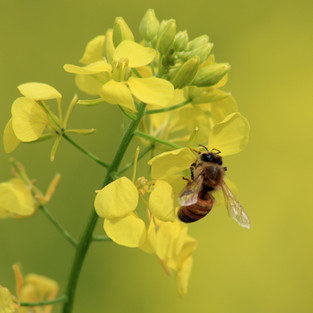PGM Hereford Pest Control Celebrates Solitary Bee Week!
- PGM & Son Pest Control

- Jul 3, 2020
- 2 min read
Updated: Jan 9
From 29th June to 5th July, the annual week of action and education to raise awareness about the amazing solitary bees commences.
At PGM & SON Pest Control - WE LOVE OUR BEES! 🐝
And solitary bees are no different. Most people have heard of bumble bees and honey bees but this week we’re joining the University of Exeter’s Environment and Sustainability Institute (ESI) and Cornish product designers, Green&Blue to help raise awareness of the solitary bee.
What’s a solitary bee?
A solitary bee doesn’t produce any honey or wax and they don’t live in hives or swarm. However, they are quite sociable and often nest close to each other – despite their anti-social name!
Some solitary bees help collect pollen and nectar for their mothers to help feed their siblings – awww what kind little bees they are!
Just over two thirds of solitary bees are ‘mining’ bees nesting in burrows underground. Others are cavity nesting and prefer to live in hollow plant stems, snail shells and existing holes and tunnels in wood or mortar.
Masonry bees, more commonly called ‘mortar’ bees, are a solitary type of bee – quite often you’ll see this type of bee nesting in individual holes in mortar joints and soft bricks.
Solitary bees make up around 90% of the bee population and there are currently around 240 species in the UK. Together with other pollinating creatures, they are responsible for a third of all the food we eat so they are massively important to the planet. Hoorah for bees! 🐝
Due to increased use of chemicals in large fields and across farm lands unfortunately the solitary bee are increasingly under threat. There are less wildflower meadows and hedgerows around which historically provided home to many wildlife.
Did you know?
In some parts of China, there are no bees left to naturally pollinate and so pollination is being undertaken using paintbrushes! Wow! that’s a very gruelling task!!
What you can do this week to help the solitary bee
Share your photos on social media using the #solitarybeeweek
And, as a reminder from PGM & Son Pest Control:
Leave them Bee!
If you are watching their fascinating work – social distance yourself!
Don’t panic if your bees are active in hot weather, this is entirely normal!
Contact a local beekeeper to see whether they can relocate the nest for you (but only if it’s necessary and you are unable to leave it where it is).
If you are worried about bees, give us a call at PGM & Son Hereford as we can talk to you about why bees are important and set your mind at rest about the risk to you. In most cases, the risk of being stung will be extremely low.
In rare situations bees can be hazardous and, where there is a threat to the public, you can contact a pest controller to address the problem.
So if you have a bee problem you need help with, give PGM & SON Pest Control a call so we can discuss a range of solutions with you, which enable us to live in harmony with our friends the bees.









